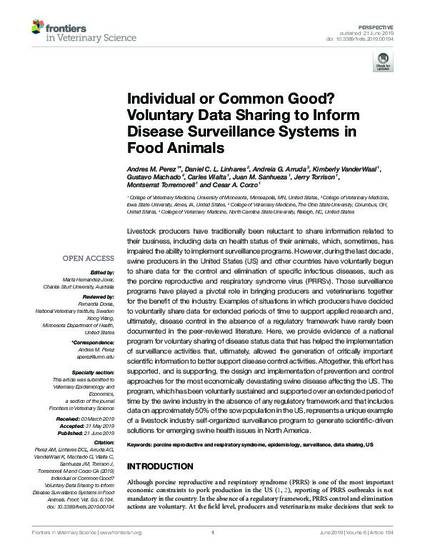
Livestock producers have traditionally been reluctant to share information related to their business, including data on health status of their animals, which, sometimes, has impaired the ability to implement surveillance programs. However, during the last decade, swine producers in the United States (US) and other countries have voluntarily begun to share data for the control and elimination of specific infectious diseases, such as the porcine reproductive and respiratory syndrome virus (PRRSv). Those surveillance programs have played a pivotal role in bringing producers and veterinarians together for the benefit of the industry. Examples of situations in which producers have decided to voluntarily share data for extended periods of time to support applied research and, ultimately, disease control in the absence of a regulatory framework have rarely been documented in the peer-reviewed literature. Here, we provide evidence of a national program for voluntary sharing of disease status data that has helped the implementation of surveillance activities that, ultimately, allowed the generation of critically important scientific information to better support disease control activities. Altogether, this effort has supported, and is supporting, the design and implementation of prevention and control approaches for the most economically devastating swine disease affecting the US. The program, which has been voluntarily sustained and supported over an extended period of time by the swine industry in the absence of any regulatory framework and that includes data on approximately 50% of the sow population in the US, represents a unique example of a livestock industry self-organized surveillance program to generate scientific-driven solutions for emerging swine health issues in North America.
Available at: http://works.bepress.com/daniel-linhares/24/

This article is published as Perez, Andres M., Daniel CL Linhares, Andreia Goncalves Arruda, Kimberly VanderWaal, Gustavo Machado, Carles Vilalta Sans, Juan Sanhueza, Jerry Torrison, Montserrat Torremorell, and Cesar Corzo. "Individual or common good? Voluntary data sharing to inform disease surveillance systems in food animals." Frontiers in Veterinary Science 6 (2019): 194. DOI: 10.3389/fvets.2019.00194. Posted with permission.